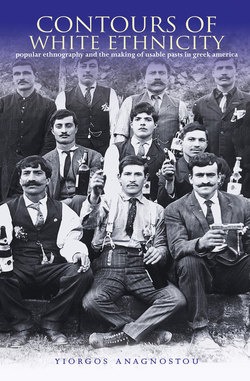Contours of White Ethnicity

Реклама. ООО «ЛитРес», ИНН: 7719571260.
Оглавление
Yiorgos Anagnostou. Contours of White Ethnicity
Отрывок из книги
CONTOURS OF WHITE ETHNICITY
Ohio University Press
.....
Its accessibility to wide audiences makes popular ethnography of particular analytical importance. The extensive circulation of popular accounts is in no small measure due to the saturation of the public sphere with ethnic commodities targeting niche audiences, a process that I discuss in chapter 2. Public sites of multiculturalism—including ethnic festivals or parades, children’s entertainment, museum exhibits, television programs, films, documentaries, the ethnic studies section in bookstores, as well as ethnic studies programs in universities—bring ethnicity into national consciousness. Ethnic marketers and producers are in a position to reach consumers of ethnic products in the “sacred” space of middle-class life, the entertainment center. Under these conditions, popular ethnographies become key texts through which the public encounters and acquires knowledge about ethnic and immigrant Others. They also work as venues through which audiences may reflect on practices, ideas, and images of ethnicity and race. As Anna Karpathakis and Victor Roudometof (2004, 279) report, Helen Papanikolas’s family biography Emily-George shapes how Greek immigrants in New York City explain ethnic mobility and race-based socioeconomic stratification. In the “age of ethnography” (Lambropoulos 1997, 199), market forces and the ideology of multiculturalism intersect to intensify the valence of popular ethnography about ethnicity in the American public sphere. Therefore, popular ethnographies urgently demand scholarly attention precisely because of their capacity to bring ethnicity deep into the cultural fabric of the nation.
In the broadest terms, my work examines how popular ethnography produces accounts about ethnicity in relation to immigrant pasts. I engage with this production and circulation by asking how popular ethnography intersects with the transnational and intranational movement of people, values, and ideas. I am interested in analyzing how nonprofessional ethnographers map the specific political and social geographies where cultures take root or become rerouted, are dismantled, reworked, or revived at given historical moments and under identifiable relations of power. In other words, how does popular ethnography produce ideas and traditions that have traveled across space and through time—specifically across transnational fields, through generations, within immigrant collectivities, or in the psychic and social worlds of individuals—and beyond the boundaries of ethnicity in conversation with dominant discourses, all in identifiable historical moments.
.....